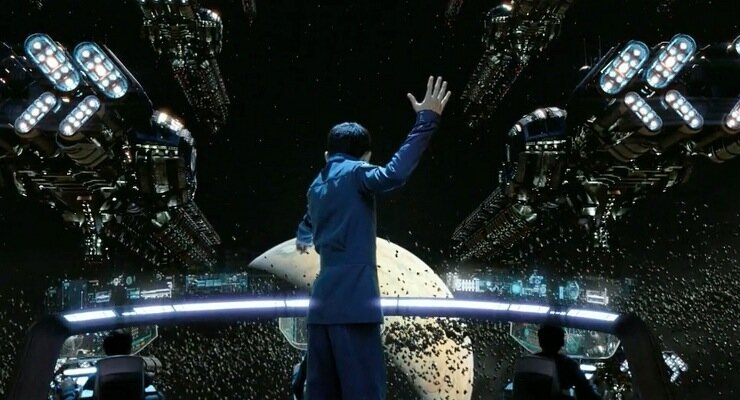
A while ago I saw Ender’s Game the movie. It’s one of those “classic sci-fi books” that’s been on my “to-read” list for years. The movie made me buy the book.
Ender’s Game is a surprisingly spartan and minimalist piece of writing. Judging from the movie, which often felt like it was rushing things, I expected more detail from the book. That said, Orson Scott Card’s clean, crisp writing style worked very well for me (very different to the highly descriptive, “high-adjective” style of most Black Library books), though he lays it on a lot thicker in some parts, than the movie shows. Still, it was an enjoyable read overall.
Also, I saw the movie first, read the book second. That’s gonna colour my opinion and this review. Just the way things are.
The human race faces annihilation.
An alien threat is on the horizon, ready to strike. And if humanity is to be defended, the government must create the greatest military commander in history.
The brilliant young Ender Wiggin is their last hope. But first he must survive the rigours of a brutal military training programme – to prove that he can be the leader of all leaders.
A saviour for mankind must be produced, through whatever means possible. But are they creating a hero or a monster?
#1 – The Book
The book I have is the “Film tie-in edition” with the movie-poster as cover.
It’s a cheap. 5 quid. Not much to it. I was hoping for a foreword or something that ties it to the movie, though there was nothing of that kind. It’s a simple re-print with a new cover.
#2 – The Story
It’s impossible to talk much about Ender’s Game, movie or book, without major spoilers.
In a nutshell, Andrew “Ender” Wiggin is the brilliant kid-protagonist (much younger, actually, than he is portrayed in the movie), who goes through several years and stages of military training to make him the best space fleet commander the world has ever seen, something humanity desperately needs to win an intergalactic war against the insectoid “Buggers”.
As far the latter go, there are a few interesting thoughts on how an advanced, space-faring “insectoid” and “hive-mind” civilization would think and act, what they would take for granted and what not. Fun stuff.
However, for most of the book, the emphasis is less on the war or the “Buggers” (though it is always in the background), and mostly on Ender’s development and training, how people try to shape him and how he changes as a result of his training, his experiences and his family.
Unlike the movie, there are also some (by now) quaint Cold War-style underpinnings. It’s a book from the early-mid 1980s after all, when sci-fi authors could dream up intergalactic warfare, proto-internet-style networks and a gazillion other cool things, but still thought the world would be divided into the Cold War Blocs many hundred years from now.
It’s actually kinda fun to read, and is a minor enough element as to not distract from the story. It is, however, arguably the books weakest part (if you read it in 2013), and was, I think, rightfully omitted from the movie.
… Spoiler!…
There is also a twist-ending that probably played a big role in making Ender’s Game a classic.
#3 – Writing Style and Movie Comparison
The most notable thing to me was the crisp, minimalist writing style of Orson Scott Card, which is a very different beast from the highly descriptive Black Library stories or the flamboyant Space Operas of Iain M. Banks.
I enjoyed it. It ready very fast, making the book a good page turner.
Having seen, written and talked about the movie, a common comment I met was that the movie cut out a lot. I actually think it didn’t, and arguably added even a bit more to the ending. The pseudo-Cold War-stuff is gone, but Ender’s training and development is there (though, admittedly, not spread across different actors from 6 years to about 11 years).
The spartan writing style, however, suits itself very well to having your imagination fill in the blanks and the “visual” (if you haven’t seen the movie), and inevitably (I think) people imagined it in different ways that didn’t necessarily match the movie-aesthetics.
#4 – Verdict
Ultimately, I enjoyed the Ender’s Game the book. It was a quick read and the story is good (though steeped in 1980s sci-fi tropes). The movie, it seems, flopped quite badly, so I assume most people will stick with the book (and no sequels, I suppose).
On the downside, the story of Ende’s Game is showing it’s age a bit at the seams, and the way Orson Scott Card describes Ender (and his siblings) as the most brilliant human beings ever alive struck me as far more extreme, and more blunt, than the movie did it.
On the upside, his writing style is crisp, clear and to the point. It’s fast-paced, relatively straight forward and definitely not the kind of “heavy reading” in the way a few other 1980s (or earlier) sci-fi classics are.
If you enjoy classic (non-grimdark-gothic) sci-fi, Ender’s Game is definitely worth a try.








